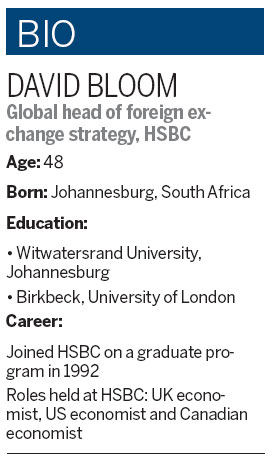The growth of a baby brother
Updated: 2013-03-15 07:57
By Cecily Liu (China Daily)
|
||||||||
|
David Bloom says the internationalization of the renminbi will help restore confidence and stability to global trade and financial markets. Cecily Liu / China Daily |
The Renminbi has credentials to be a reserve currency alongside the dollar, says forex expert
The internationalization of the renminbi is benefiting global trade and bringing stability to financial markets, says David Bloom, global head of foreign exchange strategy at Europe's largest bank HSBC.
The 48-year-old banker sees this trend as something important amid the current global currency war, caused by economies such as Japan and Switzerland devaluing their currencies to drive up domestic growth and exports.
"A currency war is very destructive," Bloom says. "Luckily, China has adopted an increasingly 'hands-off' approach to create a more flexible exchange regime, and it has helped to create more peace in the world."
Brazilian Finance Minister Guido Mantega coined the term currency war in 2010 to describe a spiral of competitive devaluations in industrialized countries, with the adverse effect of driving speculative flows into developing nations that typically have higher interest rates.
Such concerns heightened in recent weeks, after the Japanese yen declined about 20 percent as a result of the bold inflationary moves since Prime Minister Shinzo Abe assumed office in December. The moves attracted widespread criticism and were the main topic of discussion at last month's Group of Seven and G20 summits.
Bloom says currency manipulation existed long before the financial crisis, but has attracted greater attention in recent years because of the poor global growth.
Luckily, dramatic adjustments in currencies like the Swiss franc, the yen and the Brazilian real are counterbalanced by liberalization of the renminbi and the Russian ruble, Bloom says.
"So two very big countries luckily are going in the opposite direction, and that's very comforting. We could get de-escalation. I'm hoping we're living in the worst of (the currency war) now," he says.
Bloom feels that China has not been affected too much by the currency war, as its exports are still competitive internationally.

But he points out that further devaluation of the yen, perhaps by another 15 or 20 percent, will have adverse effects on Chinese exports.
Furthermore, such a move in the yen will give Japanese exports an obvious unfair advantage, which will probably attract attacks from many other governments internationally, he says.
"That's what we're really worried about. Like in the 1930s, you start to get political friction from governments and that's very bad for growth," he says, referring to the Great Depression.
At the same time, the renminbi's internationalization will help restore confidence and stability to global trade and financial markets, as its exchange rate will have relatively low volatility, Bloom says.
"I think for China, stability is more important than either appreciation or depreciation. We've seen especially since the financial crisis how important financial stability is."
China's push to internationalize the renminbi started in 2008, when the global financial crisis demonstrated the danger of over-reliance on the US dollar, the world's dominant reserve currency. During the G20 summit in 2008, Chinese President Hu Jintao called for "a new international financial order that is fair, just, inclusive and orderly".
Beijing soon began to encourage the use of its currency in international trade, swap arrangements among central banks, and bank deposits and bond issuances in Hong Kong.
Trade in offshore renminbi has since boomed. Increasing Chinese exports also led to a surge in demand for renminbi outside the mainland as Chinese exporters increasingly expect to be paid in their own currency to eliminate exchange risks.
Bloom sees these as encouraging signs that the renminbi has already become a major trading currency globally, which is the first phase of its internationalization.
But the renminbi's internationalization is yet to complete its second phase of becoming a global investment currency, and the third phase of being a reserve currency, he says.
The second phase is important to drive up renminbi liquidity because investment transaction volumes on a global scale are far larger than trade transaction volumes, he says.
"World trade in goods is roughly $25 trillion a year. But foreign exchange turns over roughly $5 trillion a day. So in a week we can do the entire world's trade. What we do for the rest of the time is buying and selling capital goods."
China's capital goods, such as bonds, stocks and property, can now only be traded abroad by qualified foreign institutional investors with a limited quota.
But in recent years, China has gradually relaxed these controls. One significant move is the establishing of offshore renminbi centers, initially in Hong Kong, and more recently in Singapore and Taiwan.
Bloom says the renminbi's development as an investment currency is accelerating. This is because the Chinese government can relax capital controls quickly without worrying too much about speculative inflows, as the renminbi has already reached fair value after appreciating against the US dollar by more than 30 percent since 2005.
"Therefore if China relaxes capital controls now, there are incentives for Chinese people to invest outside of China, and for people outside of China to invest into China."
Other signs showing the renminbi to be at fair value are China's stable level of exchange reserves, and reasonable trade surplus and current account surplus, he says. China's foreign reserves have stayed at around $3.2 trillion since 2011.
He says that once the volume of renminbi transactions builds up, the cost of transactions between the renminbi and other currencies will fall, and the volume of transactions will rise. This will automatically lead to the third phase of making the renminbi a reserve currency.
"The dollar is currently the biggest reserve currency because it is the gateway through which transactions between other currencies are made."
For example, if a trader wants to sell Singapore dollars and buy South African rand at a bank, the bank sells Singapore dollars to buy US dollars, and then sells US dollars to buy rand. This is because liquidity of the US dollar is high, hence transactions between the US dollar and other currencies are cheaper and more accessible, he says.
But in future, if China's trade volume with both Singapore and South Africa outgrows that of the US, the renminbi may in effect replace the US dollar to become the gateway between the Singapore dollar and the rand, he says.
Bloom believes the renminbi is likely to become a gateway currency between Asian currencies and commodity currencies, in the same way that the euro is now a gateway currency between other European currencies.
"I'd call it a baby brother reserve currency to the dollar. Its existence alongside the dollar will help to diversify risks for traders and investors globally."
cecily.liu@chinadaily.com.cn
(China Daily 03/15/2013 page24)

 Li Na on Time cover, makes influential 100 list
Li Na on Time cover, makes influential 100 list
 FBI releases photos of 2 Boston bombings suspects
FBI releases photos of 2 Boston bombings suspects
 World's wackiest hairstyles
World's wackiest hairstyles
 Sandstorms strike Northwest China
Sandstorms strike Northwest China
 Never-seen photos of Madonna on display
Never-seen photos of Madonna on display
 H7N9 outbreak linked to waterfowl migration
H7N9 outbreak linked to waterfowl migration
 Dozens feared dead in Texas plant blast
Dozens feared dead in Texas plant blast
 Venezuelan court rules out manual votes counting
Venezuelan court rules out manual votes counting
Most Viewed
Editor's Picks

|

|

|

|

|

|
Today's Top News
Boston bombing suspect reported cornered on boat
7.0-magnitude quake hits Sichuan
Cross-talk artist helps to spread the word
'Green' awareness levels drop in Beijing
Palace Museum spruces up
First couple on Time's list of most influential
H7N9 flu transmission studied
Trading channels 'need to broaden'
US Weekly

|

|









